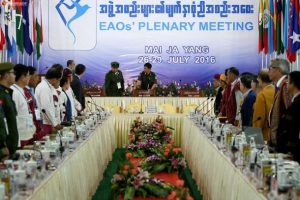Positive Developments at Mai Ja Yang, Yet Obstacles Remain Ahead of 21st Century Panglong Conference
By Burma Partnership • August 7, 2016 The Mai Ja Yang conference concluded on 30 July, 2016 after four days of meetings between ethnic armed organizations (EAOs), political parties and civil society actors in Kachin State. During the conference, participants discussed topics including the structure of the proposed federal union and whether a separate “Burman” state could be considered. In addition, the attendees agreed on eight principles that will serve as the basis for a federal union in Burma, which included: sovereignty; equality; self-determination; establishment of a genuine federal union; protection of ethnic rights, democratic rights and basic human rights; gender equality; a multi-party democratic system; and secularism.
The Mai Ja Yang conference concluded on 30 July, 2016 after four days of meetings between ethnic armed organizations (EAOs), political parties and civil society actors in Kachin State. During the conference, participants discussed topics including the structure of the proposed federal union and whether a separate “Burman” state could be considered. In addition, the attendees agreed on eight principles that will serve as the basis for a federal union in Burma, which included: sovereignty; equality; self-determination; establishment of a genuine federal union; protection of ethnic rights, democratic rights and basic human rights; gender equality; a multi-party democratic system; and secularism.
The 17 EAOs attending the Mai Ja Yang conference universally agreed on the need to place the Burma Army under civilian control. Though non-binding, this agreement demonstrates the willingness to place greater oversight and accountability on the Burma Army, which has long played a powerful role in Burma’s political sphere. On another positive note, the Arakan Army (AA), the Myanmar National Democratic Alliance Army (MNDAA) and the Ta’ang National Liberation Army (TNLA) agreed to a long sought after meeting with the Burma Army to discuss their involvement in the Panglong Conference. Backpedaling on a previous demand, the Burma Army agreed to ongoing discussions with these three EAOs without forcing them to first disarm. While the Burma Army should not have authority over whether EAOs disarm in the first place, this move signals the hope for a more inclusive peace process moving forward.
One criticism of the conference was that it was not more inclusive – despite this being a central tenet of the upcoming Panglong meeting. The Mai Ja Yong conference was not attended by the United Wa State Army (UWSA), the ethnic Kokang MNDAA, the TNLA or the National Socialist Council of Nagaland – Khaplang. The UWSA and its ally, the National Democratic Alliance Army, otherwise known as the Mongla group, however, met instead with Daw Aung San Suu Kyi separately in Naypyidaw, which also focused on the upcoming peace conference.
A few additional concerns were brought during the National Ethnic Youth Conference, which ran almost concurrently to the Mai Ja Yang conference between 27 July and 1 August, 2016 in Shan State. The peace process took center stage at the youth conference, with participants questioning whether the future federal union would provide equal rights to ethnic minorities that were not guaranteed their own autonomous state or region. Further, the conference included discussion on the role of natural resources in exacerbating political tensions during the peace process. According to Khun Oo, a spokesperson for the National Ethnic Youth Alliance, “When we analysed the causes of conflict, natural resources were seen to be one of the principal issues.”
The Shan Human Rights Foundation recently confirmed the concerns of the Youth Conference, citing evidence of recent human rights violations and conflict – largely by the actions of the Burma Army – in Shan State’s Hsipaw coal-mining operations. Fortunately, the NLD-led Burma Government appears interested in quelling resource-related tensions as noted in the release of their economic policy. The policy, though far from specific, proposes a more equitable distribution of the wealth derived from natural resources across the country. However, as noted by Khu Oo Reh, representative of the United Nationalities Federal Council, ethnic groups have long been exploited for their natural resources by successive Burma Governments. Therefore, the Burma Government must go a step further with the 21st Century Panglong Conference and welcome ethnic nationalities to jointly lay the foundations of a federal union which guarantees them as equal partners and equal stakeholders of the union and thus having greater control over their resources.
While the Mai Ja Yang conference resulted in several positive outcomes, the Burma Government, EAOs, and other stakeholders must continue to engage to solve existing obstacles ahead of the upcoming Panglong conference. Inclusivity should continue to be mandated and involve discussions not only with major EAOs, but also representatives from minority ethnic groups, civil society actors, women and – as evident in the National Ethnic Youth Conference – Burma’s youth population. The Burma Government should also make a genuine effort to respond to the aspirations, agreements, and advice provided by all participants of the Mai Ja Yang conference, especially the eight principles as the basis for a federal union of Burma. By allowing inclusive participation and diverse and meaningful contributions to the peace process, as well as a commitment to laying the foundations of the country based on essential pro-human rights principles, Burma can only hope to achieve a lasting peace.
Tags: 21st Century Panglong Conference, Burma Partnership, Ethnic Armed Organizations, Human Rights, Kachin State, Mai Ja Yang Conference, National League for Democracy, Peace ProcessThis post is in: Blog
Related PostsBurma Partnership Celebrates Continuing Regional Solidarity for Burma and Embraces the Work Ahead for Progressive Voice
U.S.: Lifting Sanctions on Myanmar Puts Human Rights Progress At Risk
United Nationalities Federal Council Statement
21st Century Panglong Conference Reaffirms Obstacles to Peace
The Elders welcome Myanmar peace conference









 All posts
All posts